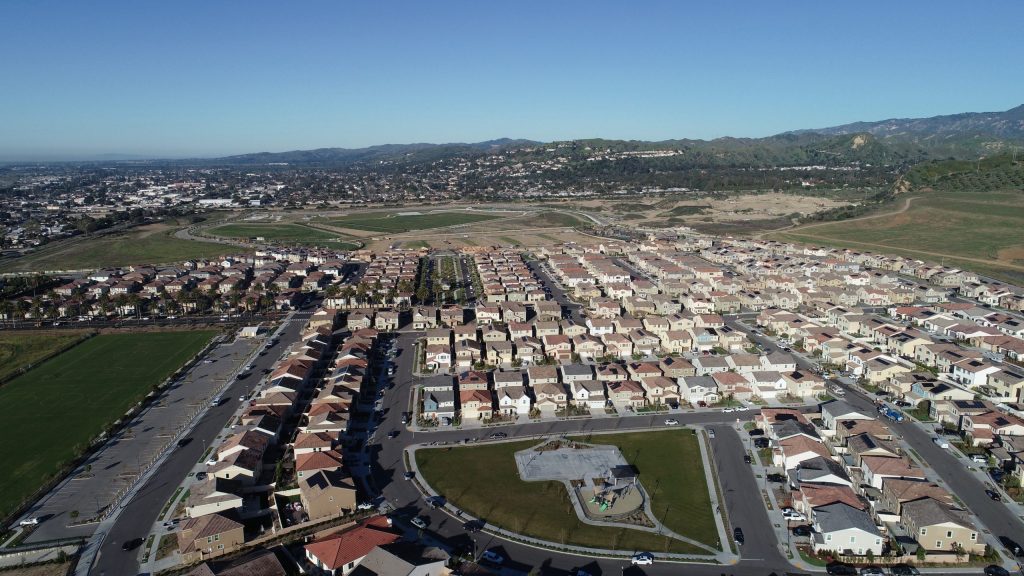Homebuilder Lennar buys 554 residential homesites at Harvest at Limoneira

Homebuilder Lennar has bought 554 residential homesites at the Harvest at Limoneira master-planned community in Santa Paula, lemon grower Limoneira announced May 2.
The transaction completes the sell-out of Phase 2 of the 1,500-unit development.
“This is a big deal,” Limoneira CEO and President Harold Edwards told the Business Times. Limoneira did not disclose the value of the transaction but the company’s shares jumped nearly 6% to the $21.27 range after the announcement.
Lennar is one of the primary builders of Phase 1 of the project, a 50/50 joint venture between Santa Paula-based Limoneira and The Lewis Group of Companies, a California-based planned community developer.
The venture has now closed 1,261 residential homesite sales at the development.
Of that number, Lennar has purchased 867 single-family homesites – 313 in Phase 1 of the project and 554 in Phase 2.
“We are excited that Lennar has committed to being the sole builder for Phase 2,” Edwards said in a press release.
“We will be able to provide an update on profitability of this transaction and actual cash to be received by Limoneira in fiscal 2024 with our earnings announcement in June,” he said.
An additional 550 units for the project have been approved by Santa Paula, bringing the development’s total units to 2,050.
Most are single family units for sale, with some rentals.
Phase 2 is the project’s Foothill Neighborhood, consisting of seven different lot types with home sizes ranging from about 1,500 to 3,500 square feet.
It will include at least 20 various floor plans utilizing distinctive architectural elevations. Some of the homes will include views of the Pacific Ocean.
The project, which is near parks, hiking trails and retail destinations, is aimed at Limoneira’s employees and the community at large.
The 131-year-old, family-owned agribusiness employs about 350 people, most from the Santa Paula area.
Edwards told the Business Times that the Harvest project is going “amazingly well.
“There’s a massive demand for housing, and we’re just trying to serve that underserved demand in Ventura County,” he said.
Edwards said the Harvest development is “literally one of those things where the second you put something up for sale, it’s snatched up.”
California, including the Central Coast, is in a prolonged housing crisis.
According to the California Department of Housing and Community Development, during the last ten years, housing production averaged fewer than 80,000 new homes each year.
Ongoing production, meanwhile, continues to fall far below the projected need of 180,000 additional homes annually.
The Harvest development is one of a number of large housing projects in the tri county region that are being built, have been approved or are proposed to help tackle the area’s acute housing shortage.
They total more than 11,000 units.
Smaller developments in the area add to that number.
Limoneira announced Dec. 1 that it’s exploring a sale, merger, acquisition or buyout that would take the company private or increase the scale and scope of the publicly traded entity to maximize value for its stockholders.
Limoneira, one of Ventura County’s largest agribusinesses, is unlikely to leave the area if it sells some or all of the company or merges with another business, Edwards said in December.
He noted that Limoneira has long had deep ties to the Santa Paula community, including the Harvest at Limoneira development.
Given that, he said then, “Whatever we do, we’ll do it with the best interest of the community in mind which we view through a lens of stewardship.”
Founded in 1893, Limoneira is a producer of lemons, avocados, and other crops with 11,100 acres of agricultural lands, real estate properties, and water rights in California, Arizona, Chile, and Argentina.
It went public in 2010 when the family-owned enterprise had too many shareholders to remain private.
email: [email protected]









